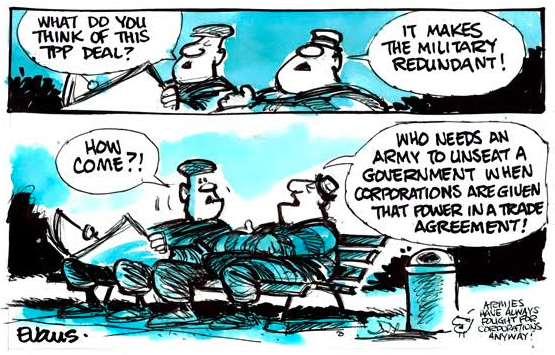
The Labour-New Zealand First government will be hoping that New Zealanders have got short memories as it celebrates the entry into force of the rebranded Trans-Pacific Partnership Agreement, minus the United States.
It’s just over a year since they did a u-turn on their opposition to the TPPA and proclaimed a new improved “progressive” deal. No-one really bought the spin, but the politicians clearly calculated the fallout from business if they backed off the deal would be more politically damaging than betraying their support base.
The earlier criticisms of the TPPA are as valid now as they always were.
Despite the hype about changes that protect future regulation from potentially crippling investment disputes, the governments of Japan, Canada and Singapore refused to sign side-letters that would exclude New Zealand from the investor-state dispute settlement (ISDS) regime.
In Opposition, Labour called the economic case that was made for the original deal “flawed”, when the US was still part. The justification is even shoddier now.
The new government promised us a more balanced, future-focused alternative. Instead, it is celebrating a failed 20th century model that locks New Zealand into low value-added export economy.’
New Zealand needs a trade policy that builds on a national economic strategy for the 21st century that support sustainable local businesses and a living wage.
That was the core economic message from a two-day hui that a number of organisations hosted on an Alternative and Progressive Trade Strategy in Auckland in mid-October.
A new JusTrade website, with presentations from the hui and other research, will be launched in early January. It aims to kick start the debate on genuine alternatives to the TPPA model as the government’s Trade for All Advisory Group belatedly begins its work.
While it may be too late to stop this agreement, we can avoid digging ourselves deeper into this counter-productive hole. More importantly, we can create positive momentum towards a new paradigm that addresses the pressing challenges of climate change, precarious work, digital technologies, power asymmetries within and between countries, and the erosion of democracy, sovereignty and te Tiriti.


Well said Prof Jane — Makes one wonder what the point is of having Labour, NZ First (when Peters said capitalism has failed NZ), and Greens in power. Hope one day they build on their $75 kids’ lolly scramble, and incremental hikes in the living wage. More than one year in, and as far as I can see their achievements can be counted on one hand; second year in the term, as always, will be used to “consolidate”; third year to start campaigning again.
If Labour and National haven’t received the ‘memo’ about Brexit and the rise if Trump, then they havent been paying attention. If they ignore the rusing tide against globaliaation, neoliberalism, which results in jobs exported overseas and stagnating wages , the lessons of extremist Nationalism may bite them on their red and blue backsides. As it is, Simon Bridges is alrwady beatiing the proto-nationalist drum with his anti UN rhetoric.
The backtracking by Labour on the TPPA or whatever the fuck its called these days, reinforces why the pubkic see politicians as a dishonest, self-serving bunch of careerists.
Come on Prof. Kelsey, are you for real?
NZers have SHORT MEMORIES, and short attention spans, that is the vast bulk of the population here.
To presume something different raises concerns about your sense for reality. You have lost your battle, sad, but that is the truth.
The Sheeples carry on as per usual, following the ‘guidance’ by ‘the market’ and their leaders, who were bought a long time ago, no matter what name their party may have.
Comments are closed.